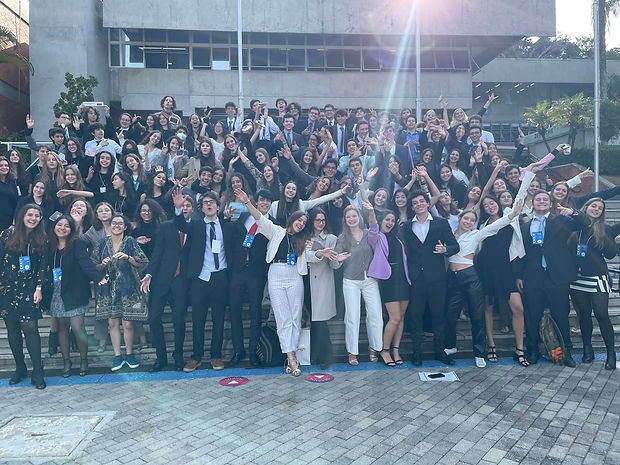POSMUN
The newspaper
Wednesday, 20th of April 2022
Day 3
ECOSOC: Dealing with the post-pandemic economic crisis
Unfortunately, POSMUN was getting to its end. In the third day of the event, ECOSOC was still voting on their second working paper. In order to start the third and last working paper, a moderated caucus happened. On Australia's speech, it declared in a very aggressive way that it was extremely disappointed with all delegations except Singapore, because none of them mentioned children on their speech. WBG answered, saying that there was a clause about that subject, so, Australia apologized and said she has not read it.
POSMUN is on fire, literally! In the last council of Porto Seguro Model United Nations of ECOSOC, an accident happened. The chair hit her hammer so hard on the table that the extension cable that was under the table, burned, making fire sparks.
With that, Posmun ended, sadly. But all the great moments will be amazing memories! And next year will be even more awesome!
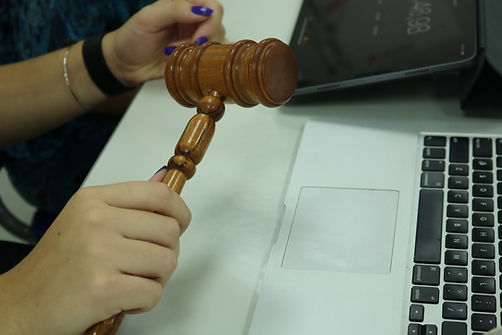
After all, the draft resolution was made and the work for the delegates was done. ECOSOC group started the "delewards", a google forms where the delegates were voted and received a title, for example: "delegato", which means the cute delegate. The one that received it was the delegate representing the World Bank, Gustavo Campos.
To officially end POSMUN 2022, the closing ceremony occurred. Where the team gave a little speech, and each chair and vice-chair called out the honourable mentions and the best delegate from their committees. In the case of ECOSOC the honourable mentions were Delegations of Russia and Singapore. And the best delegate of the committee was the delegation of the World Bank.
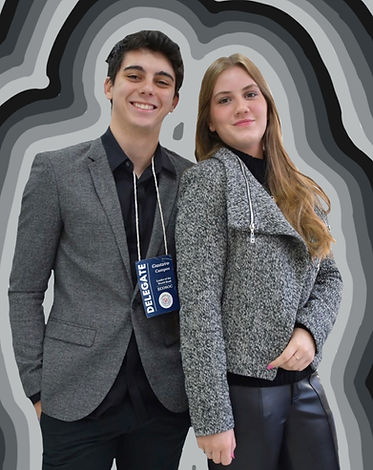
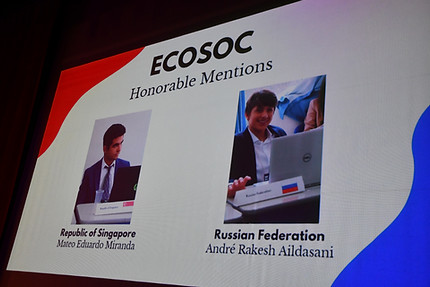
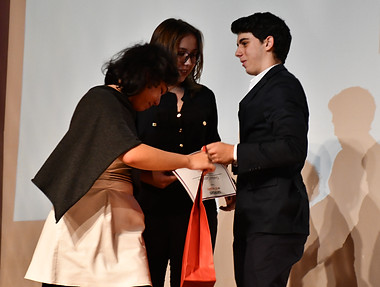

by Gabriella Aprile
DAY 3: Until next year POSMUN!
UNODC: Good Use and Abuse: The Role of Technology in Human Trafficking
It’s the final day of POSMUN. One more year till missing class, dressing up for school, watching heated debates and listening to all the juicy gossip. So, without further ado: POSMUN day 3.
The first council session of the day got right to the point. The delegates were rather worried about the time factor, since solving their crisis took so long, due to a complication with Syria. They hurried to discuss the remaining clauses on their agenda so that they could work on their final resolution draft later on. The first part of the debate was friendlier compared to the day before. The delegations talked about NGOs as a way to help combat human trafficking and assist victims, which introduced the option of a database that could be accessed by governments. Soon a new subject surged: Russia as one of the biggest human trafficking centers. Several delegates commented on how little Russia seemed to be doing to end these crimes.
After the coffee break, the council was focused on their working paper. There was an unmoderated caucus so that the delegates could converse about all the solutions mentioned for human trafficking. In the working paper many options of recommendations were established.
The topics discussed earlier in their conversations were added to their text. It took them some time to put everything they had talked about into writing, but once that was finished the council collectively went over the paper, which was passed by the chair.
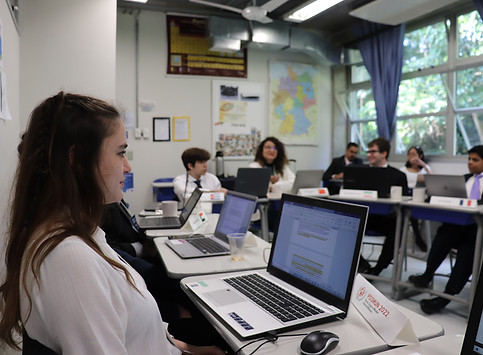
UNODC’s working paper consisted of 8 clauses, several containing sub-clauses. In short, they suggest the following:
-
That countries have their schools educate students on human trafficking.
-
Investments in NGOs that are working to solve human trafficking in person.
-
The creation of a database that contains information on victims and traffickers.
-
The creation of an anti-trafficking law enforcement training that would provide online coaching for law enforcers.
-
The reinforcement of countries to take part in the UNGIFT.
-
Advising countries with resources to help others.
-
The creation of an international organization to fight against human trafficking.
-
The creation of an international project with the goal to develop technology to help stop trafficking.
The last step was to bring all the information from the past 3 days together in the resolution paper. Once that was finished and “resolution in order” was announced by the chair, the final council session of POSMUN was concluded. All the delegates, ushers, chairs and press present in the room then voted for the delewards. Before everyone left the room, the council was adjourned for the last time. Afterwards there was lunch and the closing ceremony. And that, was the end of POSMUN 2022, till next year!
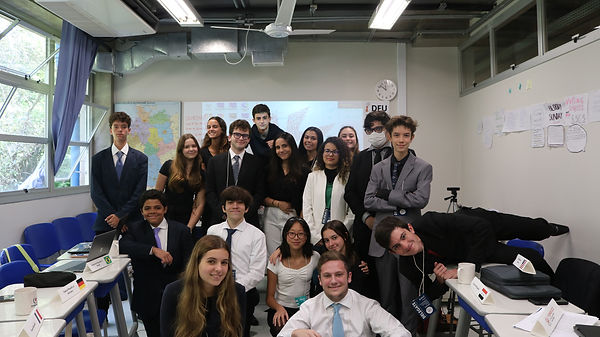
by Allegra Ho
The last day of debates at Human Rights Council:
Final discussions, last working paper and draft resolution. This is all what happened in the last day at the Human Rights Council at POSMUN 2022.
After a productive day of debates and great resolution of the crisis, the eighth committee session started off with a debate in form of a speakers list to discuss the fourth topic of the agenda: “Acceptance of immigrants”. Topics such as financial and health aid, and social insertion were diligently discussed by the committee, not forgetting about other problems faced by immigrants such as xenophobia and transfer of personal documentation.
The inclusion of refugees into these methods of helping immigrants was not forgotten. Delegations of Australia and Vietnam reiterated the necessity of including them in these projects, since most immigrants leaving forced labor conditions are illegal. The delegate of the USA attempted to influence all present countries to openly receive immigrants, respecting if they are able or not to do so. The delegation of Australia suggested the use of the Asian Pacific International Immigrant Service (APIS), a project founded by immigrants, who strives to provide outstanding immigration services for those who desire to work, study, visit, or move to Canada. The delegate of Russia then came to question the delegate of the United States of America on the reasons why they haven’t opened their borders to all types of immigrants. The American delegate then stated that their country is the one who receives the most immigrants in the world, which was then controverted by the Russian delegate, saying only immigrants seeking the American Dream and better life conditions go to the USA. He also claimed about the fact that no war immigrants move to the United States.
The American immigration policies were then questioned by many other delegations, like Eritrea. The delegate of Eritrea also didn’t forget to mention other countries who are able to receive many immigrants and haven’t spoken until now about that, such as Germany, who is known for being open to all kinds of immigrants. The delegation of Thailand was also criticized on their immigration policies. The delegation of Russia pointed out a contradiction on the American delegate’s speech, saying their country does not offer good living conditions for immigrants and strengthens their borders when comes to allowing them in, making many of them suffer even more.
Although the USA has many useful projects for immigrants, such as the DACA program, the country also has one of the biggest deportation rates. These come from the American Ministerium, mainly the US Immigration and Customs Enforcement (ICE), which is also one of the most violent government agents. The delegations then entered an unmoderated caucus to work on the committee’s fourth working paper.
It was then presented to the committee and voted clause-by-clause. The document states that all delegations receiving immigrants shall offer all forms of aid possible at their arrival, regulate the entry of immigrants, offer them assistance on finding a job and school for their kids, assiduously combat rejection and xenophobia and provide them personal documents granting their citizenship on the country.
Thankfully, the document was fully accepted, and the delegations were able to start the draft resolution. To do so, they entered a unmoderated caucus, which went until the end of the session.
The final debate session initiated with a unmoderated caucus, so that the delegates can finish elaborating the draft resolution. The document was then presented by the delegation of Australia. Through the resolution, the committee reiterates the necessity of helping immigrants coming from forced labor situations, reducing unemployment, creating programs which would improve countries’ financial situations, uniting countries to help each other with concerns of developing ones, reinforcing International Labor Organization (ILO) laws, establishing laws for child labor, improving developing countries’ schools’ nutritional and educational conditions, reintegrating modern slavery victims into society, reinforcing investigation on forced labor in countries, giving refugees and immigrants personal identification cards, distributing refugees throughout developed countries, regulating immigrants entry in countries, constantly promoting integration of immigrants into society, and of course acting assiduously against all types of forced labor, human trafficking and modern slavery in all countries.
The recognition of the issue coming from countries in which forced labor knowingly happens wasn’t forgotten as a resolution for the problem. The draft resolution was not completely accepted, with the chairs suggesting the addition or removal of amendments. After some discussion it was completely accepted, and the debate was officially closed. The chairs then congratulated the committee for all the hard work and evolution the delegates had.
After a slow first day, in the second one they could create a rhythm and keep it up until the end of the debate, and they were praised for this. Formal commendations went to the delegates of the United States of America and Vietnam. Finally, winners of the deleawards were:
-
Delegato: Russia and Bangladesh
-
Delegata: Germany
-
Delechato: Vietnam
-
Deleostra: Russia
-
Deleghost: United Kingdom
-
Delezap: Qatar
-
Delefofo (a): Philippines
-
Deleestilo: Qatar
-
Delecouple: Qatar and Russia
-
Delefolgado: Russia
-
Delesono: Nepal
-
Delebrisa: Qatar, Korea, Russia and USA
-
Delehair: Russia and Philippines
-
Dele-gado: Russia
-
Deledonalds: Bangladesh
-
Deledictator: North Korea
-
Delecoffeebreak: Nepal
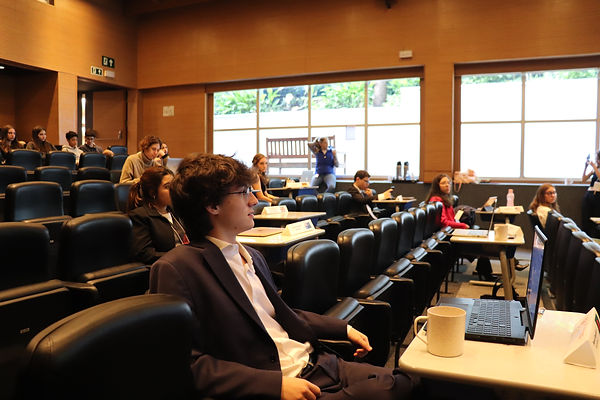
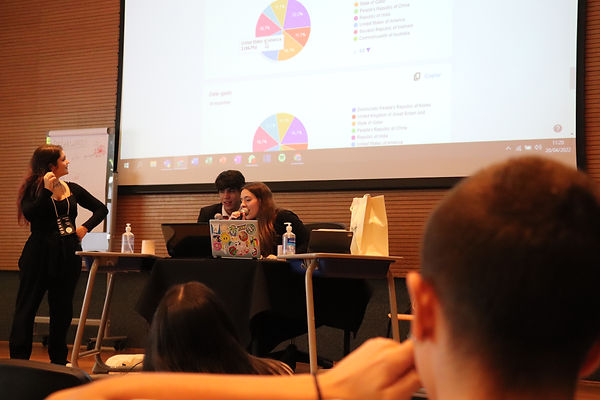
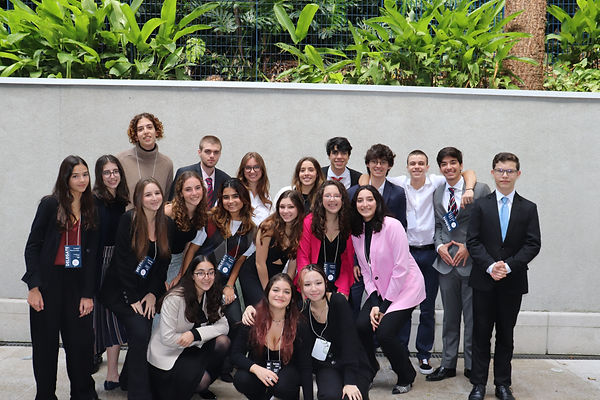
by João Gabriel Frick
The third day of debate
UNEP - Green legislation: International effects of Amazonian deforestation.
After the project was completed, the UNEP committee started the delegate awards through a voting procedure.
At 2:20 PM the delegates arrived at the closing ceremony and the following delegates from the UNEP received awards:
-
Best delegate: Hannes Lübke representing the Dominion of Canada.
-
Honorable mention: Matheus Donner Abreu Becker representing the Kingdom of Netherland.
-
Honorable mention: Thomas Calazans representing the Bolivarian Republic of Venezuela.
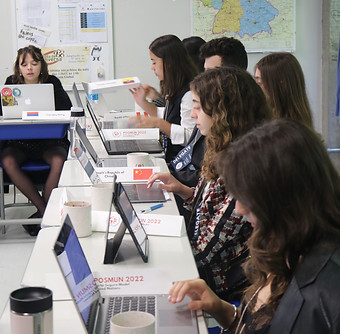
During the 8th session of the council the delegates started a voting procedure for the draft resolution, voting clause by clause, including subclauses and also suggesting a semi-moderated congress in order to discuss amendments.
During the 9th session of the council the delegates continued the voting procedure for the draft resolution. Here is their finished project:
https://docs.google.com/document/d/1uHLpR12nvQWsyCquqlb2ETh-dwAPjOzLB4MSdGtO2EI/edit?usp=sharing
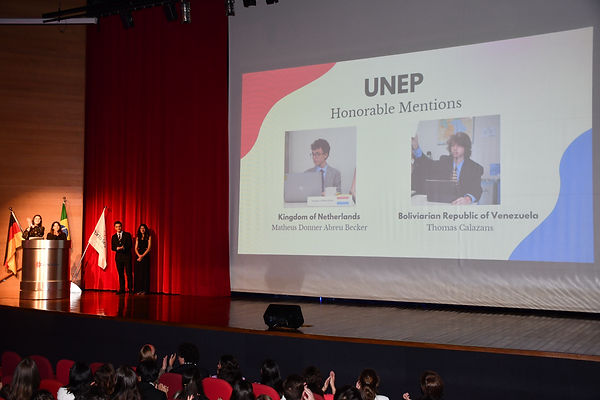
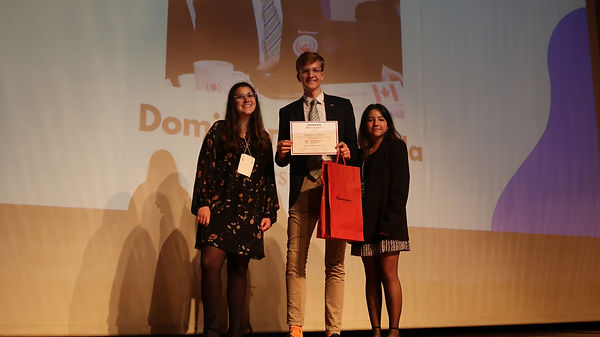
During lunch, the press of the UNEP decided to ask the opinion of some of the delegates about their experience on Posmun 2022:
-
Hannes Lübke representing the Dominion of Canada: Hannes really pointed out the organization of the whole event and the progress of the first timers throughout the tree days of debate.
-
Heloisa Ziolkowski representing the Russian Federation: Heloisa says she really liked the event, but believes that the delegates with some former experience in debating should be separated from the first timers.
-
Mariana Arena representing the Kingdom of Denmark: Mariana affirms that she really enjoyed the events and looks forward to participating on following ones, besides from showing her appreciation for learning many things about such an important theme that was presented by UNEP this year.
Thank you for the cooperation of the diligent delegates, chairs, press and ushers.
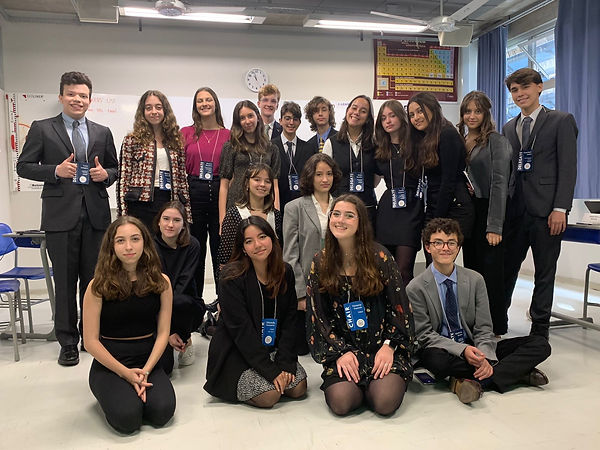
by Mariana Viellela
UN Women Day 3
The third day at UN WOMEN committee started more calmly, as the committee was already well advanced in terms of agenda discussions. However, before any discussion could start, the chairs made the roll call to check if everyone was present and voting. All delegates declared themselves present and voting, except for the Federal Democratic Republic of Ethiopia, who declared herself as just present and The Swiss Confederation, Republic of Japan and French Republic that were absent.
A motion was then raised by the New Zealand delegate to open a speaker list in a moderated caucus. This motion was accepted. The discussion of working paper 5, that is, suggestions of solutions for the physical and psychological effects due to menstrual poverty, was resumed. The first subtopic that was discussed was encouraging the creation of sports group projects to psychologically help with the consequences of menstruation poverty. Ideas such as yoga (which does not require many objects to be performed, promoting relaxation), walking (which would be carried out by specialists with the help of the government), manual activities (carried out with natural resources, where the process would not be expensive), breathing exercises, (which helps to calm down and helps with anxiety) and sports in teams (which encourage and support others) were mentioned. The idea of manual activities was further reinforced by Venezuela, which claimed that this would be great for her country, as it is not expensive and as a result people can make their own clothes, which solves the problem of Venezuelans' lack of money to buy clothes. The places where these exercises would take place were also briefly discussed, where places such as community centers, public places and parks were mentioned.
Countries still continued to discuss for quite some time, where even the idea of caring for or adopting animals as a subtopic was suggested, as they have been scientifically proven to reduce anxiety. This idea, however, was not generally agreed, as countries with financial problems declared that individuals from their countries could not afford to have these animals. As a general conclusion, however, the countries decided that as solutions they could:
1. Encourages the international recognition of menstrual poverty as a type of neglect and abuse;
2. Suggests the creation of support groups held in already existing community centers where menstruating people that have experienced menstrual poverty can share their experiences;
3. Encourages the creation of online platforms where menstruating people can share their experiences regarding menstrual poverty and seek proper volunteer help from psychologists;
4. Encourages the partnership from countries in need with companies that produce electrical devices, such as computers and access to the internet.
5. Calls upon the Global Financing Facility for Women, Children and Adolescents (GFF) to offer financial help for countries that are not able to provide decent aftercare for those who have suffered menstrual poverty.
6. Encourages the creation of the project “Move it and improve it” with the objective of promoting sports and manual activities for victims of menstrual poverty as a way to promote a better mental health and also to minimize the impacts of any type of trauma.

After resolving the last outstanding topic on the agenda, the working paper was presented and all countries approved it. So, this was sent to the chairs to correct. The United States delegate then raised a motion suggesting an unmoderated caucus to decide the next topic to be discussed. The motion passed. The New Zealand delegate then suggested that the committee begin work on the draft resolution. All countries agreed, and so the draft resolution began to be worked out, where each working paper (1 to 5) was copied and evaluated point by point, to see if everything was in order or if the delegates would still add or remove any clauses.
The clauses then began to be read and evaluated, where some were accepted without any changes and others underwent some modifications, such as the first clause, the third, the fourth and among others. A motion to postpone the session until after the coffee break was suggested by the New Zealand delegate and approved by the chairs. Soon after the coffee break, the roll call was made and the countries continued the evaluation of the clauses. After a certain time, all the clauses could be evaluated and some modified. Later on, with 10 votes in favor and no votes against it, the draft resolution successfully passes. The end of the session was commemorated with claps from the delegates, the chair, the ushers and the press.
The delewards also caused a commotion in the committee. The winner delegates were:
-
Iran as Deleostra;
-
New Zealand as Delegata;
-
India as Delefofa;
-
China as Delechato;
-
Brazil as Deleghost;
-
New Zealand as Delefashion;
-
the Vice Chair Victória as Good Chair;
-
the Chair Jordana as Bad Chair;
-
USA as Deleboche;
-
USA as Delefaca;
-
USA vs New Zealand as Deletreta;
-
China as Delemocionado;
-
Ethiopia as Delebrisa and
-
Iran and Ethiopia as Delecouple.
After the voting, the press came to take more pictures and the delegates finally received their certificate and left for lunch, officially putting an end to the discussion at the UN WOMEN committee in POSMUN 2022.
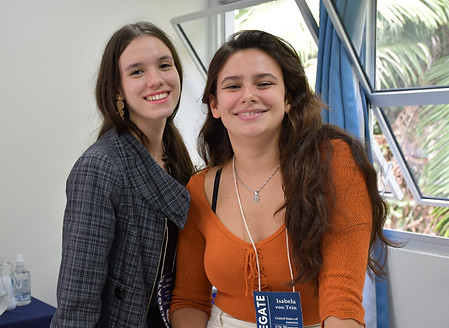
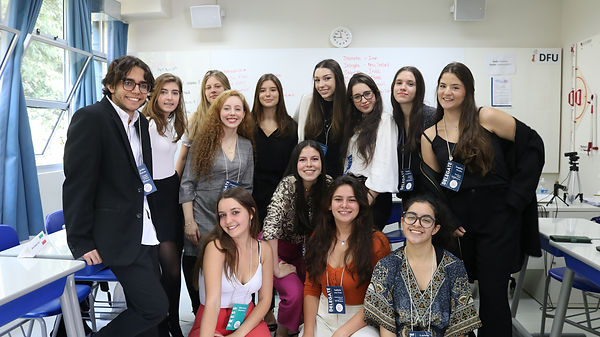
by Mariane Heineken
Security Council
The last day of this amazing experience has begun. Social and Security finally came as main topic and aiming the well-being of the refugees, the delegations of Germany, France, the UK, China and Denmark financed programs to provide medical aid, better distribution through the countries willing to welcome the refugees and funds. The OECD encourage other countries to receive refugees by helping create new jobs and foster a strong education. After 10 minutes of unmoderated conversation, the fourth working paper was finished. Something to laugh about was that after looking what time it was, the delegate of the Russian Federation called a motion to adjourn the debate even though there were still “3 min” left. The honorable chairs even agreed with it and voted for it, with the majority of the council agreeing with it. Sadly one of the delegates looked at the schedule that our ushers write very carefully every day and noted that it was only 8:27am and that the coffee break would only be at 9:30am. Everyone laughed about it when the chairs realized the mistake they’ve made. Still the delegates, ushers and press hoped that the coffee break would still take place at 8:27am.
After break, the delegations asked for unmoderated caucus and the wish was granted. They repeated that at least four times. The room became quieter and quieter by the minute, the end was getting closer and the awards as well. The delegations finished their last working paper and a motion to vote the document was called. Thankfully everybody agreed and the council came oficially to an end. After the awards everyone had their palms red and maybe a smile on their faces.
Happy holidays everyone! Hope you enjoyed it a little bit, because to be honest I did.
Letícia Amaral, the member of Press responsible for the Newspaper in this committee, made a full table regarding the countries's positions during the three days of the event. With the last day going by quickly, we were unable to verify the allies and enemies of certain delegates during the third day, but they are special cases. Here's the complete table:
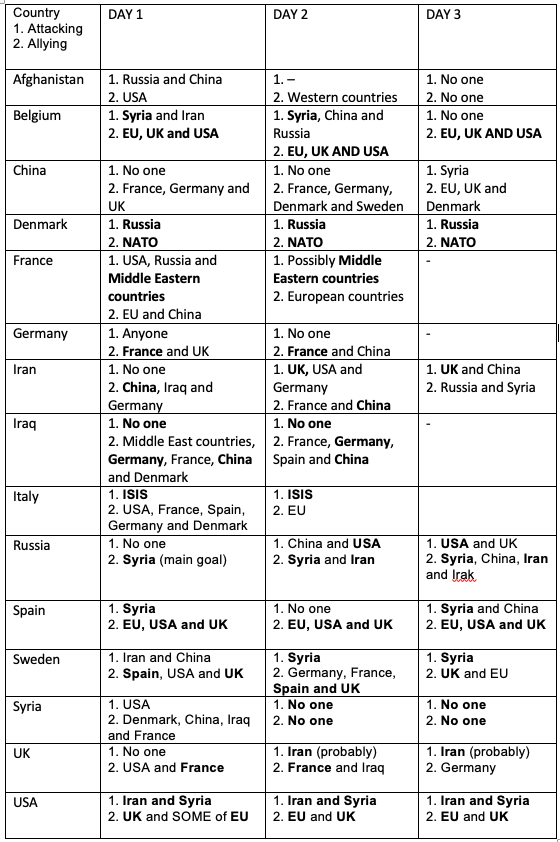

by Letícia Amaral
Closing Ceremony:
The end of POSMUN 2022
Unfortunately, POSMUN is coming to an end. The Heads of Ceremony Laura and Ian initiated the closing ceremony by inviting the Faculty Advisor, Michelle Hofer, to make a speech. She cited the Deputy Secretary General’s speech from the Opening Ceremony and delivered very kind words on what all participants have acquired during the event. She praised the Executive Board and Heads for such a well-organized event. The Advisor was also able to define POSMUN through the words: “Power, Organization, Social project, Motivation, Unity and Nerves”, and congratulated the whole POSMUN-Community on all what was developed throughout the event.
The Executive Board was then invited on stage to talk about this year’s edition of the event. Our Secretary General, Florin, declared that POSMUN 2022 was a true success. The Board showed their pride and happiness about what they’ve built through very beautiful and emotional words.
They went on to announce the delegation who won best opening speech: Germany. The Secretary General, President of the General Assembly and the Deputy Secretary General also seized the opportunity to thank the Heads of Ceremony, Press, Logistics, Social Commitment and Ushers, and the Chairs. Florin, Pedro, and Gabriela talked about all their experiences and what they acquired this year. They also wished all the best to the organizers of POSMUN 2023. May they carry the beautiful legacy of POSMUN.
A beautiful rewind of this year’s event was shown during the ceremony. The Head of Social Commitment, Gabriel, was then invited on stage and encouraged everyone to donate menstrual products until the end of the week. He also thanked the Executive Board, Ushers, and Heads for the opportunity, and all the 7.400 donations that were received until now.
Then, the most awaited moment of the ceremony came. Chairs and vice-chairs were invited on stage to talk about these three days of debate and hand out the awards. ECOSOC was first. The Chair, Laura Komatsu, and Vice-chair, Paola Caponi, showed their satisfaction with the debate and the progress of their delegates. They also talked about all challenges and fun moments of the committee. Honorable Mentions went to the delegates of Russia and Singapore, and the award of Best Delegate went to the Leader of the World Bank. Second up was the Human Rights Committee, where the Chair, Camila Siqueira, and Vice-chair, Lucas Haola, took this chance to talk about all the moments lived in the Committee. They showed how happy and proud they were about the debates and delegates. Honorable Mentions went to the delegations of Eritrea and Russia, while the Best Delegate award went to Australia. Security Council was up next. The Chair, Otto von Maltzan, and Vice-chair, Felipe Rucker, clarified all what happened during the three days and showed how satisfied they were with everything. Honorable Mentions were given to the delegations of Spain and France, and the delegate of Russia won Best Delegate. The Chair, Jordana Veronese, and Vice-chair, Victoria Accurso, from UN Women, then came on stage to show how glad they were with the moments lived in the last three days, and the remarkable evolution of their delegates. Honorable Mentions went to the delegates of New Zealand and Mexico, and United States of America was the winner of Best Delegate. UNEP’s Chair, Victoria Fazenda, and Vice-chair, Eduarda Mayumi, got a bit emotional while talking about the debate and delegates. Through affectionate words, they expressed their delight with everything their delegates could show through the committee. Honorable Mentions went to the delegates of the Netherlands and Venezuela, and the delegate of Canada received the prize of Best Delegate. Lastly, Ornella Faria and Thiago Profili, Chair and Vice-chair from UNODC, stepped on stage to show their appreciation and thankfulness to their delegates due to the last three days of debates. Final Honorable Mentions went to the delegates of United Kingdom and Germany, and the last Best Delegate award was handed to Venezuela.

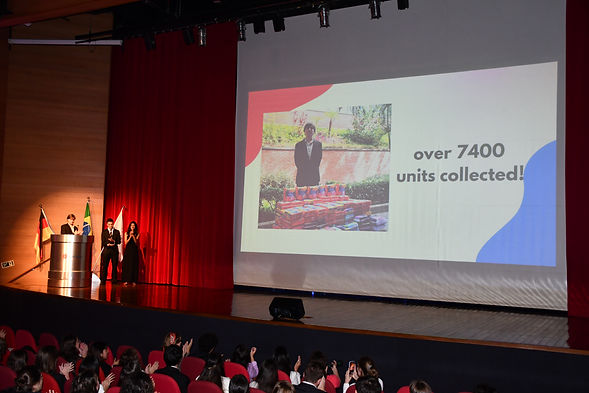

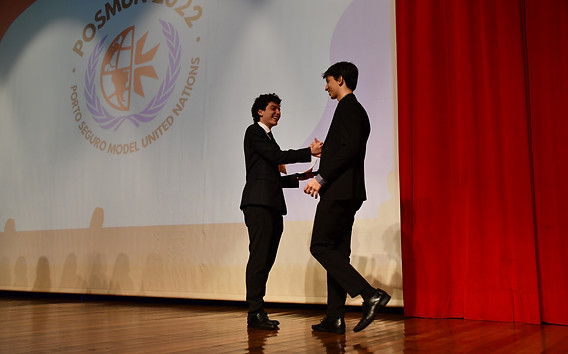

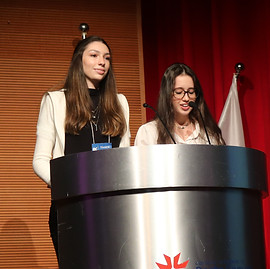
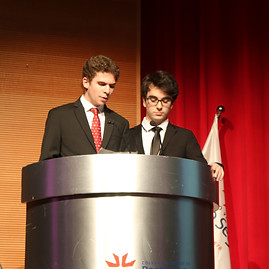

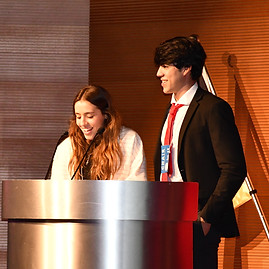
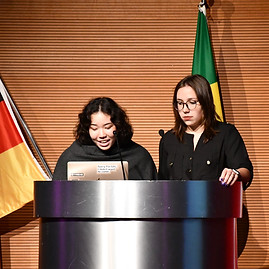
At the final moments of the ceremony, the band Midnight Spirit played the song “What you know”, originally from the northern-irish band Two Door Cinema Club. The Heads of Ceremony presented their own experiences at this and former POSMUN editions, talking about the fun and tough sides from the roles of usher, delegate, and Head of Ceremony. They also took this opportunity to thank everyone involved in the event, who were utterly important to making this edition of POSMUN so amazing. Sadly, this was the very last POSMUN for the Abiturienten of 2022. So, Laura and Ian also wished the best of luck for all who shall participate in POSMUN 2023. Sad to say, after asking for a “motion to end POSMUN”, POSMUN 2022 was officially ended.
